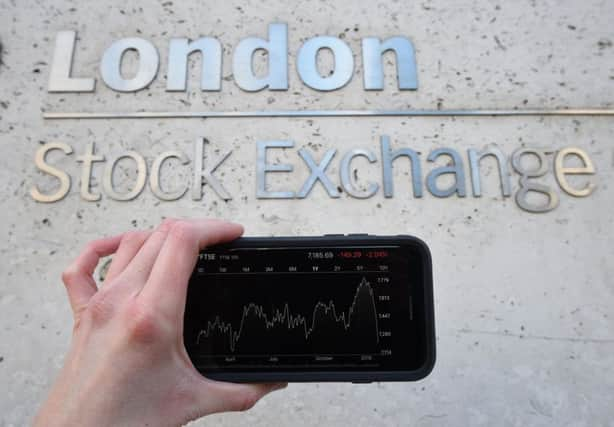UPDATED: London's top flight index crashes into the red


The FTSE 100 Index sank by more than 2.5 per cent - hitting its lowest level since late 2016 at 7,079.41 - before paring losses to fall 163.57 points to 7,167.08.
Across Europe, Germany’s Dax and the Cac 40 in France also suffered falls. The falls in Europe followed a brutal overnight sell-off in Asia and on Wall Street, where the Dow Jones Industrial Average and the S&P 500 dropped 4.6 per cent and 4.1 per cent respectively.
Advertisement
Hide AdAdvertisement
Hide AdTokyo’s Nikkei 225 Day closed down 4.7 per cent, while the Hong Kong’s Hang Seng Index plunged 5 per cent lower.
The global equity sell-off has been building since last Friday when traders became worried by the prospect of tighter monetary policy after the US posted strong average earnings data. The crash follows deep losses during Monday’s session when more than £27 billion was wiped off the value of London’s blue-chip stocks.
Connor Campbell, financial analyst at Spreadex, said: “The only hope for the markets at the moment is that investors suddenly decide that the sell-off has been a bit overdone - though in a way it is fitting, matching the astonishing, record-breaking recent rise of the global indices with an equally astounding, heart-stopping drop.
“Admittedly the Bank of England could go some way to allaying investors’ fears of rising interest rates on Thursday, if (governor) Mark Carney issues a more dovish statement than forecast.”
Advertisement
Hide AdAdvertisement
Hide AdJasper Lawler, head of research at London Capital Group, said there were “a lot of wide-eyed looks” on the trading floors.
He said: “The bloodbath on Wall Street has washed away all the confidence in European markets. The indiscriminate selling will probably continue until Wall Street finds its first bottom.
“The FTSE 100 was off its lows of the day half an hour into the trading session, down around 150 points from yesterday’s close.
“For what it’s worth, sentiment has improved from overnight pricing which at one point pointed to a 350-point opening loss for the FTSE 100.”
Advertisement
Hide AdAdvertisement
Hide AdLaith Khalaf, a senior analyst, at Hargreaves Lansdown, said: “This sell-off is the storm after the calm, as we have enjoyed an extended period of plain sailing in markets, which have crunched happily upwards for the last couple of years.
“Despite the heavy fall in the Dow Jones, the index is still trading around 20 per cent above where it stood this time last year, so it’s important to keep some perspective.
“Global markets are worried the inflation genie may be out of the bottle, after US wage growth jumped up unexpectedly last week.
“The fear is this may prompt the Federal Reserve to raise interest rates faster than expected, which would push up bond yields and make equities look less attractive by comparison. It would also make it more costly for companies to finance their activities if debt becomes more expensive, after a decade of cheap money, thanks to loose monetary policy in the wake of the financial crisis.
Advertisement
Hide AdAdvertisement
Hide Ad“There is also some good news to latch on to if you like your cup half full - a strong US economy is good for global growth, and that should bode well for company profits. However markets are likely to see this as a double-edged sword, at least in the short term, as it means US interest rates may normalise more quickly.
“Occasional corrections are part and parcel of a functioning stock market, deflating pockets of exuberance, and allowing new investors to buy in at lower levels. Markets are capricious beasts in the short term, and looking forward stock prices could move in either direction without defying the laws of statistics. However in the long term markets are more reliable in generating growth, and so anyone saving for retirement should still consider the stock market as a friend not a foe.”
Jacob Deppe, the head of trading at online trading platform, Infinox, said: “While the fall in global equity markets looks dramatic, it is no more dramatic than the record rises we have seen since the end of November. For that reason alone many would argue a correction was on the cards.
“The party may be over for now but this could be more of a sobering correction than a rout.”